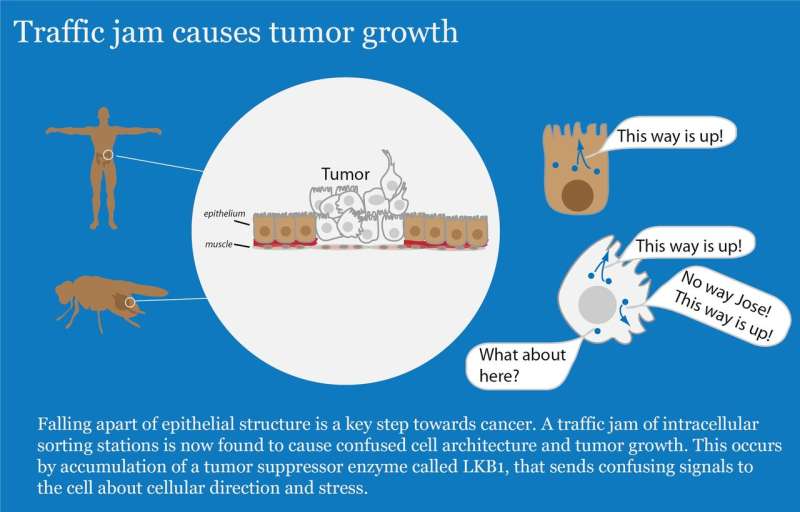Cancer research – how a traffic jam causes tumor growth

For tissues to cooperate and perform normal functions, cells need to know which way is up. When cells lose track of their orientation, they can start to grow out of control, and develop into cancer. Now, a team of researchers has identified a new regulator for cell orientation, offering a future target for precision medicine in cancer treatment.
Tissues in the breast, pancreas, colon and lungs are all organised as single cell layers called epithelia. Cells sit side by side, and use internal signals to orient themselves. The signals for telling which way is up are connected to the waste handling system, a series of miniature vesicle sorting stations.
"We have discovered how a traffic jam in the sorting inside cells can cause tumor development," says senior author Tor Erik Rusten at the Centre for Cancer Biomedicine at the University of Oslo and Oslo University Hospital.
LKB1 activity promotes tumor growth
Our cells contain tumor suppressor genes that act as gate-keepers to prevent tumor growth. One such classical tumor suppressor, Liver Kinase B1 (LKB1), was identified as being responsible for the hereditary cancer predisposition syndrome, Peutz-Jeghers syndrome. It has later been shown to be mutated in a range of cancers, including lung and colon cancer.
The new results suggest that the enzyme LKB1 exists on vesicle sorting stations and is shut off in normal cells, but that the traffic jam allows LKB1 to remain active for a longer time.
"High activity of LKB1 contributes to tumor growth by sending confusing signals to the cell about which way is up," says Rusten.
The researchers investigated epithelial tissues in the fruit fly Drosophila melanogaster, a powerful animal model system for medical research, in addition to human cells grown in 3-D cultures in the lab. In both systems, high activity of LKB1 increased stress signals in the cells and disrupted cellular orientation.
Targeting LKB1 as potential therapy
Rusten and colleagues further tested the effect of genetically removing LKB1 from cells that otherwise would form tumors due to loss of orientation.
"To our surprise, reducing LKB1 activity restored normal epithelial organization and prevented tumor growth. These results suggest that pharmacological inhibition of LKB1 may be beneficial as treatment in some cancer types," says Rusten.
It will be important to determine if pharmacological agents can specifically target LKB1 in animals or in human cells in culture, and how such potential treatment may be transferred to the clinic.
"This is another example on how long-term financial commitments to basic research can lead to high-quality preclinical results. Hopefully, our findings will help provide better treatment for future cancer patients," concludes Rusten.
The studies were initiated as a collaboration between post doctoral researchers Fergal O'Farrell and Viola Lobert at the CCB, centre of excellence and the results published in the journal Nature Cell Biology this week.
More information: Fergal O'Farrell et al. Class III phosphatidylinositol-3-OH kinase controls epithelial integrity through endosomal LKB1 regulation, Nature Cell Biology (2017). DOI: 10.1038/ncb3631

















